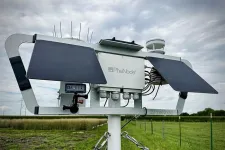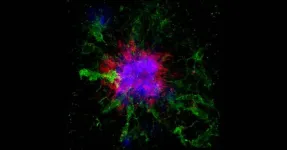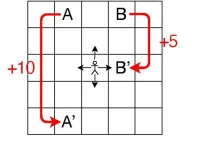(Press-News.org) Scientists spectacularly confirmed the existence of gravitational waves several years ago, but now they are searching the cosmos for new and different types of these waves that result from different objects in deep space.
Benjamin Owen, a professor in the Department of Physics and Astronomy at Texas Tech University, was recently awarded a three-year National Science Foundation (NSF) grant that aims to uncover and confirm additional types of gravitational waves.
“So far with gravitational waves we’ve seen what happens when you have two black holes and/or neutron stars spiraling together and merging,” Owen said, referring to the scientific breakthrough that occurred in 2015 with confirmation of the waves. “There are new types of gravitational waves that have not been detected yet, but we know they are out there at some level.”
Part of Owen’s research is in done within the Laser Interferometer Gravitational-Wave Observatory (LIGO) Scientific Collaboration, a scientific community dedicated to studying and expanding knowledge about gravitational waves. His research also is connected to the current work of Alessandra Corsi, a colleague in the same department.
“The best-case scenario would be that we find one or more of these new gravitational-wave signals in the next year or so,” Owen said. “That would be great because it would give us the opportunity further understand how neutron stars live in the universe and how they evolve. These new kinds of waves would tell us things the current signals don’t.”
Gravitational waves were predicted by Albert Einstein in his theory of relativity more than a century ago. When their existence was confirmed, it opened an entirely new field of scientific exploration that probes the extremes and the origins of the universe.
“Neutron stars are the most extreme form of matter in the modern universe,” Owen said. “We have learned a lot about them through various other means, but gravitational waves opened a new window looking directly inside them. Basically, the matter in the core of a collapsing star, when it’s squished down to this incredible density, causes things to happen that you don’t see anywhere else in the universe since the Big Bang.”
The NSF grant will allow Owen to learn more about neutron stars and what takes place in their interiors to produce these different types of waves, one of which is characterized by short bursts and the other as more continuous and longer-lived. It also will prepare the way for an eventual transition from LIGO to Cosmic Explorer, a new detector expected to become fully operational in approximately 15 years.
“By the time of Cosmic Explorer, we hope to see a number of these other types of signals from neutron stars,” Owen said. “There will be a more sensitive detector, and we will get more information on what’s going on in the far corners of the universe as far as some of the crazy things that can happen to matter.”
The research conducted now will help lay important groundwork for the future.
“The idea is, as the grant continues, we test basic searches on LIGO data, maybe find something, and develop better techniques that will take advantage of better data and extract more information,” he said. “Cosmic Explorer is approximately 15 years out, but what we do today makes the scientific case for what we ought to see and what we can learn, not just to improve the experiment, but to improve the mathematics and programming to use it to its fullest capability.”
END
Listening for “sounds” from the far corners of space
2023-08-21
ELSE PRESS RELEASES FROM THIS DATE:
Agrela Ecosystems ignites innovation in data-driven agriculture
2023-08-21
ST. LOUIS, MO, August 21, 2023 – Agrela Ecosystems, a startup launched by Nadia Shakoor, PhD, principal investigator, at the Donald Danforth Plant Science Center announced the pilot launch of its flagship product, PheNodeTM. This milestone marks the first step towards a full-scale commercial release set for 2025. PheNode is an advanced, scalable environmental sensor platform designed to empower users with customizable data collection and the rapid integration of new technologies. Already creating a buzz, the platform is now collecting data and generating customer feedback, ...
PS gene-editing shown to restore neural connections lost in brain disorder
2023-08-21
MINNEAPOLIS/ST. PAUL (08/21/2023) — A new study from the University of Minnesota is the first to demonstrate the ability for gene therapy to repair neural connections for those with the rare genetic brain disorder known as Hurler syndrome. The findings suggest the use of gene therapies — an entirely new standard for treatment — for those with brain disorders like Hurler syndrome, which have a devastating impact on those affected.
The study was published in the Nature journal Scientific Reports.
Hurler syndrome, also known as mucopolysaccharidosis type I (MPS I), is a genetic disorder affecting newborns ...
Argonne receives funding to use AI and machine learning for nuclear physics research
2023-08-21
The U.S. Department of Energy (DOE) announced $16 million for 15 projects that will implement artificial intelligence (AI) methods to accelerate scientific discovery in nuclear physics research. DOE’s Argonne National Laboratory will lead two of those projects and be a collaborator on another.
These projects will use AI and Machine Learning (ML) tools and methods for nuclear physics experiments, simulation, theory and accelerator operation to expand and accelerate scientific reach.
“Artificial intelligence has the potential to shorten the timeline ...
Bloom studying impact of exposure to perfluoroalkyl substances on weight loss
2023-08-21
Michael Bloom, Associate Professor, Global and Community Health, received $158,900 from the National Institutes of Health for the project: "Impact of Exposure to Perfluoroalkyl Substances on Weight Loss: A Pilot Study of Hispanic Children with Overweight/Obesity Participating in a Community-based Weight Loss Intervention Program."
In this pilot study, Bloom is evaluating associations between exposures to perfluoroalkyl substances (PFAS) and weight lost during a 10-week weight loss intervention among Hispanic children with overweight and obesity. He and his collaborators will quantify the association between 12 different PFAS ...
Schintler & collaborators to study perceptions of efficiency & bias in algorithmic versus human peer review
2023-08-21
Laurie Schintler, Associate Professor, Schar School of Policy and Government, is set to receive funding for the project: "Perceptions of Efficiency and Bias in Peer Review: Algorithmic versus Human Decision Making."
This project is a collaboration between the Schar School of Policy and Government (GMU) and the Department of Sociology and Anthropology (CHSS-GMU). The investigators on the team include:
PI Laurie A. Schintler;
Co-PI Connie L. McNeely, Professor, Schar School of Policy and ...
McDonald to investigate privacy ecosystems among vulnerable populations
2023-08-21
Nora McDonald, Assistant Professor, Information Sciences and Technology, is set to receive funding from the National Science Foundation for the project: "Collaborative Research: SaTC: CORE: Medium: Beyond App-centric Privacy: Investigating Privacy Ecosystems among Vulnerable Populations."
Prior research shows that people who have privacy concerns may be reluctant to access medical services. This is especially true for vulnerable populations, such as those who because of their gender, race, ethnicity, socio-economic status, or other marginalizations are more susceptible to privacy risk. These risks go beyond individual apps ...
Acosta & Burls using weather model & geologic data to test tectonic mechanisms in intercontinental setting
2023-08-21
Paul Acosta, Postdoctoral Scholar, Atmospheric, Oceanic and Earth Sciences (AOES), and Natalie Burls, Associate Professor, AOES; Graduate Program Director, Climate Dynamics, received funding from the National Science Foundation for the project: "Collaborative Research: Using a weather model and geologic data to test tectonic mechanisms in an intercontinental setting: The Altai Mountains of Central Asia."
This project seeks to apply new advances in atmospheric and geosciences to ...
Ye receives National Science Foundation CAREER Award
2023-08-21
Jinwei Ye, Assistant Professor, Computer Science, received funding for the project: "CAREER: Towards Polarimetric Visual Understanding."
In this project, Ye will study how the way surfaces reflect polarized light can be used to help recognize objects more effectively.
Ye will address the following two questions: (1) How does the polarization of light change after interacting with various types of surfaces? (2) What can polarized light tell us about the kinds of objects that it has interacted with?
Addressing these questions can lead to significant improvements in machine vision systems by strengthening their capability to do geometric ...
Intermittent fasting improves Alzheimer’s pathology
2023-08-21
One of the hallmarks of Alzheimer’s disease is disruption to the body’s circadian rhythm, the internal biological clock that regulates many of our physiological processes. Nearly 80% of people with Alzheimer’s experience these issues, including difficulty sleeping and worsening cognitive function at night. However, there are no existing treatments for Alzheimer’s that target this aspect of the disease.
A new study from researchers at University of California San Diego School ...
New “bandit” algorithm uses light for better bets
2023-08-21
How does a gambler maximize winnings from a row of slot machines? This is the inspiration for the "multi-armed bandit problem," a common task in reinforcement learning in which "agents" make choices to earn rewards. Recently, an international research team led by Hiroaki Shinkawa at the University of Tokyo developed an extended photonic reinforcement learning scheme that moves from the static bandit problem towards a more challenging dynamic environment. This study was published July 25 in Intelligent Computing, a Science Partner Journal.
The success of ...


